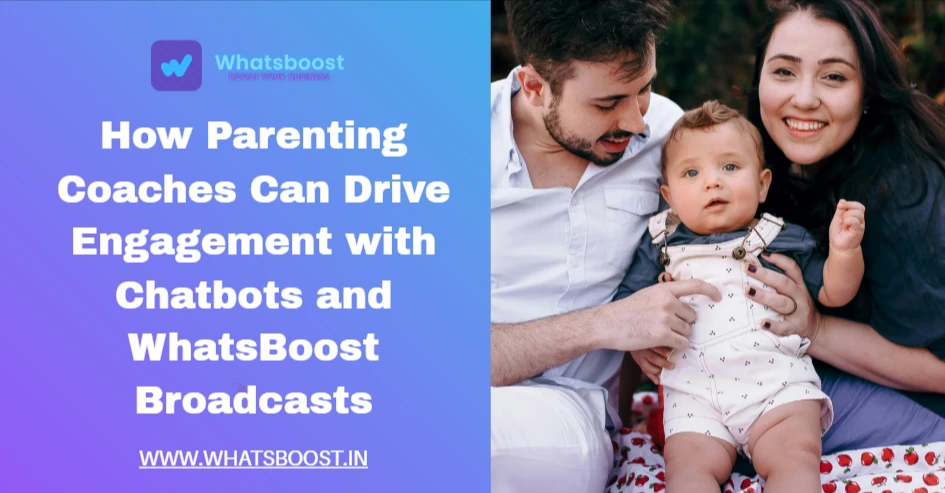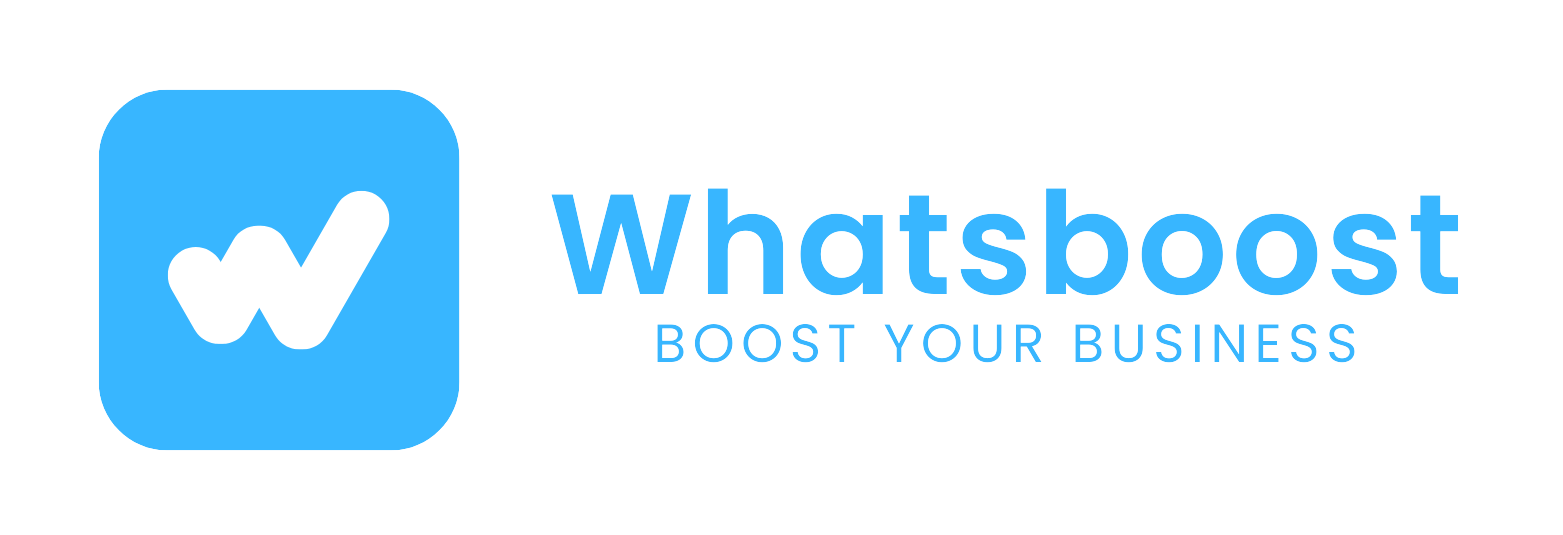
How Parenting Coaches Can Drive Engagement with Chatbots and WhatsBoost Broadcasts
Tired of answering the same parenting questions at midnight? Learn how parenting coaches use WhatsApp chatbots and broadcasts to engage clients 24/7, build community, and convert interest into bookings—without burning out.
It's 11 PM. You've just put your kids to sleep after the usual bedtime battle. You open WhatsApp and see 23 unread messages from parents asking variations of the same questions: "My toddler won't eat vegetables, what do I do?" "How to handle tantrums in public?" "Is screen time really that bad?"
You want to help everyone. But you're exhausted. And honestly? You're a parenting coach, not a 24/7 helpline.
This is exactly why smart parenting coaches are turning to WhatsApp automation. Not to replace the human touch—but to stay helpful without burning out.
Why WhatsApp Works Better Than Instagram for Parenting Coaches
Most parenting coaches waste hours creating Instagram reels that get 200 views and zero inquiries. Meanwhile, a simple WhatsApp message reaches people when they're actually seeking help—usually at night when the kids are asleep and they're desperately Googling solutions.
Think about your own clients. When do they reach out? Late evening, right? When they've just dealt with a difficult parenting moment and need guidance NOW, not when your next Instagram post goes live.
WhatsApp meets them exactly where they are—in their moment of need.
The Problem Every Parenting Coach Faces
You post valuable content. Parents appreciate it. They save it. They even share it. But they don't book your workshops or sign up for your programs.
Why? Because there's a gap between consuming content and taking action. Parents need that gentle push, that timely reminder, that personal connection to actually move forward.
That's what chatbots and broadcast messages do—they bridge that gap automatically.
How Chatbots Handle the Repetitive Questions (So You Don't Have To)
Let's be honest—80% of initial inquiries are the same five questions:
- "What's your consultation fee?"
- "Do you have weekend batches?"
- "Can you help with my 3-year-old's sleep issues?"
- "Are sessions online or in-person?"
- "How long is each program?"
Typing the same answers repeatedly? That's not coaching. That's admin work stealing your time.
Here's what a WhatsBoost chatbot does:
When a parent messages "Hi, do you help with toddler tantrums?", they instantly get:
"Hello! Yes, I specialize in handling toddler behavior challenges. I offer both one-on-one consultations and group workshops. Which would you like to know more about?"
They choose "One-on-one." The chatbot responds:
"Perfect! My consultation sessions are 45 minutes, ₹1500 per session. We can meet online via video call. Want to book a slot? I have availability this Thursday and Saturday."
All of this happens while you're putting your own kids to bed. The parent gets instant help. You didn't lift a finger.
Making Your Chatbot Sound Like YOU (Not a Robot)
The biggest mistake coaches make? Their chatbot sounds corporate and cold.
Remember—you're talking to tired, overwhelmed parents. They need warmth, not formality.
Bad chatbot message: "Greetings. Please select your query category from the options below."
Good chatbot message: "Hey there! I know parenting can feel overwhelming sometimes. What's on your mind today? Pick what fits best: 🔹 Sleep troubles 🔹 Picky eating 🔹 Tantrums & behavior 🔹 Screen time struggles"
See the difference? One feels like a form. The other feels like a friend who gets it.
WhatsBoost lets you write your chatbot responses in your own voice. Add the empathy, the understanding, the little touches that make parents feel seen.
Using Broadcasts to Stay Top-of-Mind (Without Being Annoying)
Here's what separates growing coaches from struggling ones: consistent presence.
You can't rely on parents remembering you exist when they need help. You have to gently remind them you're here—and broadcasts do exactly that.
But here's the key: Your broadcasts shouldn't be sales pitches. They should be genuinely helpful.
Monday Morning Encouragement: "Good morning! New week, fresh start. Whatever happened last week—the yelling, the guilt, the chaos—it's behind you. Today, you get to try again. You're doing better than you think. 💛"
Parents forward this to their friends. You're not just a coach—you're the voice of reassurance in their phone.
Wednesday Quick Tip: "Toddler throwing food? It's not disrespect—it's experimentation. They're learning cause and effect. Stay calm, set a boundary, move on. You've got this!"
Short. Practical. Immediately useful. That's what keeps parents engaged.
Friday Win Celebration: "It's Friday! What's one parenting win from this week? Maybe you stayed patient during a tantrum, or actually ate dinner as a family. Reply and tell me—I love celebrating these moments with you!"
This does something powerful—it invites two-way engagement. Parents reply. You respond when you have time. Relationships deepen.
Segmenting Your Audience for Personal Touch at Scale
Not every parent on your WhatsApp list needs the same message.
Some parents have toddlers. Some have teenagers. Some are dealing with sleep issues. Others are managing screen addiction.
With WhatsBoost, you can segment your broadcasts:
Parents of toddlers get: Tips on tantrums, eating habits, potty training
Parents of school-age kids get: Homework battles, social skills, confidence building
First-time parents get: Foundational advice, reassurance, basics
This way, every message feels relevant. Parents think, "She really understands my situation." That's the foundation of trust.
Automated Follow-Ups That Convert Interest into Clients
Here's a common scenario: A parent attends your free webinar. They loved it. They meant to book a consultation. But life happened. Kids got sick. They forgot.
Most coaches lose that person forever.
With WhatsBoost automation, you don't:
Day 1 after webinar: "Hi Priya! So glad you joined yesterday's session on positive discipline. What was your biggest takeaway?"
Day 3: "Quick thought—remember how we discussed setting boundaries without yelling? If you want to dive deeper into applying this with your specific situation, I have consultation slots available this week. Interested?"
Day 7: "Checking in! How's the week been? Any parenting challenges where you could use some support?"
This isn't pushy. It's caring. It's staying present without being intrusive. And it converts "interested" into "paying client" naturally.
Building Community Through Group Broadcasts
Indian parents, especially mothers, crave community. They want to know they're not alone in their struggles.
WhatsBoost lets you create that sense of community through groups where parents can:
- Share their daily wins and challenges
- Get quick advice from you
- Support each other through tough phases
- Stay motivated and connected
But here's what makes it manageable: you can schedule regular prompts and tips, so the group stays active even when you're busy.
Every Monday: An automated message asks, "What's one thing you're working on this week with your kids?"
Parents start sharing. Conversations happen organically. You chime in when you can. The community builds itself with your guidance.
The "Ask Me Anything" Broadcast Strategy
Once a week, send a broadcast: "It's AMA Thursday! Drop your parenting question below. I'll answer as many as I can tonight."
Parents flood in with questions. You pick the most common ones, record voice notes (more personal than typing), and send answers.
This does multiple things:
- Shows you're accessible and caring
- Gives you content ideas for future workshops
- Creates FOMO for those who missed it ("I should engage more with her messages")
- Builds authority as parents see you solving real problems
Handling Crisis Moments with Automated Care
Parents have meltdown moments. Their kid had a public tantrum. They yelled and feel guilty. They're questioning everything.
These moments are when they need you most—but you can't be available 24/7.
WhatsBoost can have a "crisis support" option in your chatbot:
Parent types "I just yelled at my kid and feel terrible."
Immediate automated response:
"I hear you, and I see you. First, take a deep breath. What you're feeling is guilt, which means you care deeply. You're human. Your child is okay. You're okay. Tomorrow, you'll repair and reconnect. It's not about being perfect—it's about showing up. Want some specific steps for repairing after yelling? I'm here."
Then it offers them a link to your free guide on repair and reconnection.
This immediate support? It's what builds loyalty. Parents remember who was there when they needed it most.
What This Means for Your Business
Let's talk real outcomes. Parenting coaches using WhatsBoost typically see:
More bookings: Because inquiries get instant responses, even at midnight Better retention: Regular broadcasts keep you present in parents' minds Higher engagement: Personal, relevant messages get replies and conversations Less burnout: You're not manually answering the same questions repeatedly Stronger community: Parents feel connected to you and each other Increased referrals: Happy, engaged clients naturally tell their friends
And most importantly—you get your evenings back. You're coaching during work hours and actually resting when you should be.
The Bottom Line
You didn't become a parenting coach to spend hours on admin work. You did it to help overwhelmed parents feel confident, capable, and supported.
Chatbots and broadcast messages through WhatsBoost let you do exactly that—at scale, without losing the personal touch that makes you special.
Your clients get instant support when they need it. You get a sustainable business that doesn't require you to be glued to your phone 24/7.
Ready to stay present for parents without sacrificing your own family time? That's exactly what WhatsBoost helps parenting coaches achieve—meaningful engagement without the burnout.
